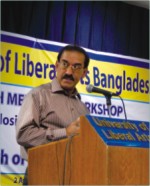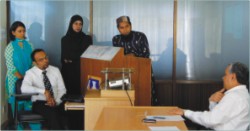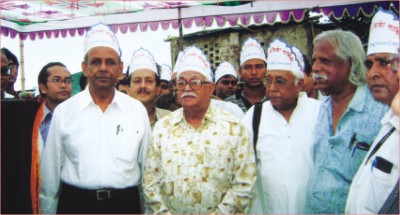| News Room
Research adda at ULAB: Creating Knowledge Zones and Learning Communities
Imran Rahman
 An innovative initiative, termed RESEARCH ADDA, was re-launched at the University of Liberal Arts Bangladesh on 2 August 2008 before an august audience, comprising of vice chancellors, professional researchers, senior journalists, publishers, and members from academia. The programme which was presided by ULAB Vice Chancellor Professor Rafiqul Islam was graced with the presence of Professor Nazrul Islam, Chairman, University Grants Commission, as the Chief Guest, and Mr. Matiur Rahman, Editor of the Prothom Alo, as the Special Guest. An innovative initiative, termed RESEARCH ADDA, was re-launched at the University of Liberal Arts Bangladesh on 2 August 2008 before an august audience, comprising of vice chancellors, professional researchers, senior journalists, publishers, and members from academia. The programme which was presided by ULAB Vice Chancellor Professor Rafiqul Islam was graced with the presence of Professor Nazrul Islam, Chairman, University Grants Commission, as the Chief Guest, and Mr. Matiur Rahman, Editor of the Prothom Alo, as the Special Guest.
Explaining the thinking behind the adda, Professor Saad Andaleeb, Professor of Marketing at Penn State University, Erie, USA and conceiver of the idea, said that the overall perception is that universities are not fruitfully engaged in the generation and dissemination of knowledge. Due to an absence of research culture in universities of Bangladesh, young faculty members, M. Phil. and Ph.D. students remain unexposed to the state-of-the-art research practices.
The research adda can serve as a powerful stimulant to the creation of an intellectual environment in which there is a constant flurry of activities such as lecture series, seminars and conferences, debates and dialogue on socially relevant issues, workshops, journals, book publications, and related intellectual activities and outcomes. Specifically, the adda is intended to assist individuals, especially the uninitiated but interested researchers, to strengthen their research methodologies before they embark on a study.
The same ceremony also celebrated the completion of a rigorous three-week workshop on Research Methods for Business and the Social Sciences that was organized by ULAB. Coordinated by Dr Andaleeb, the workshop was participated by twenty-two budding researchers, representing ULAB, UIU, EWU, NSU, IUB, DU, NU and BracU and GTZ.
 Professor Nazrul Islam, the chief guest, greatly appreciated the initiative of the research workshop and research adda. He said that although two hundred fifty or so research journals of varying quality are being published regularly, there is a great need to strengthen the rigour of research methodologies and increase the output of quality research. He rued the fact that UGC's available research grants are not fully utilized. Later he distributed certificates to the workshop participants. Professor Nazrul Islam, the chief guest, greatly appreciated the initiative of the research workshop and research adda. He said that although two hundred fifty or so research journals of varying quality are being published regularly, there is a great need to strengthen the rigour of research methodologies and increase the output of quality research. He rued the fact that UGC's available research grants are not fully utilized. Later he distributed certificates to the workshop participants.
Mr Matiur Rahman, Editor of Prothom Alo, stressed on the need for relevant research being developed locally. He said that the endless stream of "newspaper columns, round tables and TV talk shows" seem to be taking the place of real research. He assured the audience that newspapers like Prothom Alo stand ready to disseminate quality and relevant research findings to a wider audience.
Earlier in the day, six research proposals were presented before an audience of young and seasoned academics and research professionals. The presentations were followed by general discussion and useful suggestions from the expert moderators - Professors Abdul Mannan (ULAB_ and Mohammad Musa (UIU), Mr Manzur-ul Haque of Org-Quest, and Dr Kaniz Siddique. The proposal topics, five of which came out of the recent workshop, were (1) Motivating Factors Affecting Students in Secondary Level, (2) Students' Satisfaction on Classroom Assessment Factor of General Mathematics at Secondary Level in Mankiganj District. (3) Impact of Community Based Policing on Community Satisfaction, (4) Significance of Sense Management for Customer Satisfaction: Inpatients of Private Hospitals in Bangladesh, (5) Quality Perception of the Corporate Customers in the Banking Industry of Bangladesh, and (6) Cost of Hybrid Farming in Bangladesh.
(Imran Rahman is Professor and Director, School of Business, ULAB)
Health and mental care counseling at Eden Mohila College
Apollo Hospitals Dhaka recently organized HEALTH and MENTAL CARE COUNSELING on adolescent issues at Eden Mohila College on behavioral patterns of the students, emoional crisis, physical changes and relationship with teachers/parents/peers.
At the program knowledge and guidelines was disseminated to the teachers, parents and students on how to handle the adolescent issues on daily college activities. In addition, thje program was aiming to raise the awareness level of adolescent healthcare issues to ensure the proper upbringing of the adolescents of our society. Dr. Maya Mukhopadhyay, Consultant-Obs & Gynae and Counselor Farhat Hasan of Apollo Hospitals Dhaka conducted the Program.
Blood donation campaign at CU
“Jibon bachatey egiye ashun, rokto din”, with this slogan Afroza Foundation, a social welfare organization and Law Study Cell (LSC), a non-political voluntary student organization of Department of Law, University of Chittagong (CU) organized blood donation campaign at the Department of Law and at Shahid Minar premise of CU on 3rd August, 2008 to observe World Friendship Day.
The Chittagong Medical College (CMC) unit of 'Shandhani', one of the most well recognized blood-collecting organization of the country provided the technical support of the event. Family members and friends of Afroza Sultana set up Afroza Foundation in memory of her, who was a student of Department of Philosophy of CU and died of stomach cancer on 8 December, 2006.
Barapukuria Power Plant tour of KUET students
Mohammed Shaheed & Jannat Newaz (Auntu)
A group of three teachers and eighty eight students of 3rd year mechanical department of KUET, Khulna went on a visit to Barapukuria Thermal Power Plant in Dinajpur recently. The 125 x 2 MW power plant is fully run and controlled by computers. It has different types of hyper modernized technology based machinery such as PLC, DCS etc.
This is the largest steam power plant in Bangladesh. This power plant is fuelled by coal that is extracted from the coal mine, which was our second tour site. A high official of the coal mine informed us about the structure of the coal mine and said that the geological state of the coal mine is very complex. That is why extraction of coal is a risky affair. With the help of a foreign company named 'Asia Energy' the coal is being extracted under some conditions.
The coal is high-grade bituminous with very low sulfur content (less than 0.53%). A large amount of this coal is used to run the power plant which plays a vital role in meeting up the demand of electricity in our country, especially in the northern area. The coal mine is divided into six seams. The sixth one is the thickest (36m) from which coal is brought up. The other seams are not relatively thick and the coal reserved in these seams can not be taken up through a underground cutting system. The total reserve of coal is 390 million tonnes and 64 million tonnes can be extracted.
Dr. Mohammad Mashud, Associate Professor of Dept. of Mechanical Engineering said, “As engineering education is greatly related with practical purpose, such tours will highly enhance the engineering knowledge of a student.”
 |
| Gono Bishwabidyalay celebrated its 10th founding anniversary on 14th July, 2008. The function took place at 'Gonoshahstho Kendro', P. H. A. Bhaban. The welcome address was given by Prof. Mahmud Shah Quraishi, Dean, Dept. of Social Sciences, Gono Bishwabidyalay. Prof. Zillur Rahman Siddiqui gave his speech as the special quest. |
Copyright
(R) thedailystar.net 2008 |
| |
